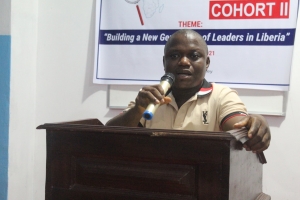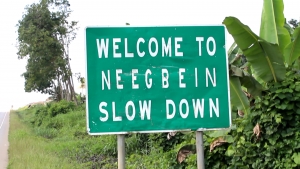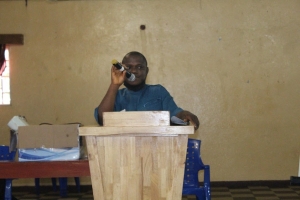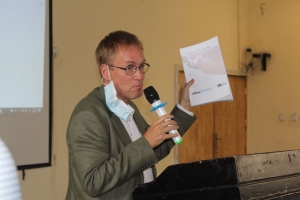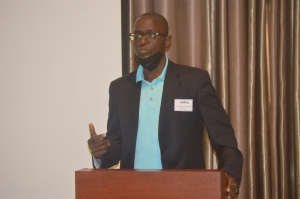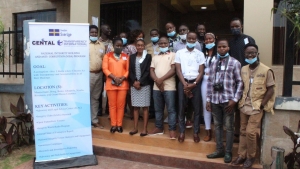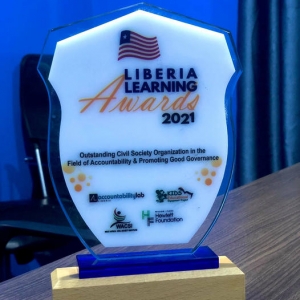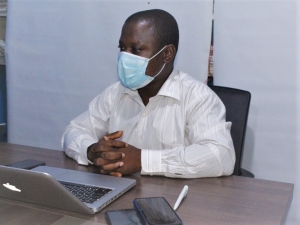“You’re empowered to join and meaningfully contribute to fighting against corruption”
Things Fall Apart -Mending a community on the brink of collapse
Things Fall Apart
-Mending a community on the brink of collapse
Corruption. The leader had brazenly indulged in it. The townspeople disavowed it. Hopes that it would be addressed fizzled with the passing of time. The local government could not confront it, and even the long-revered tradition wavered in its face. The unthinkable had happened. This time not in government but the community. A venerated community leader had engaged in corruption. The trust was broken and confidence betrayed. Corruption now stood in the way of societal harmony. Residents no longer trusted town authority. There was minimum adherence to long-held customs. Indeed, things began to fall apart.
Neegbein is a town located less than 3 kilometers from the commercial city of Ganta in Nimba County. Like other rural Liberian communities, the town has different measures and norms to control and regulate activities of its resident. Fines are imposed on violators and amounts generated from fines go toward community development. The town relied on its traditional method of saving funds with prominent individuals rather than saving with banks in Ganta just next door. Fear of bureaucracy associated with the banking process and the need for emergency interventions with the funds further justified keeping funds with prominent individuals within the community.
Nyan Gonquoi (not his real name) was entrusted with One hundred and Five Thousand Eight Hundred Liberian dollars (L$105,800) for safekeeping when he served as town chief of Neegbein. The said amount was raised through fines paid by violators. Out of the amount received, Sixty-One Thousand Liberian dollars (L$61,000) was withdrawn by the community for agreed expenditures, thereby leaving a balance of Forty-Four Thousand Seven Hundred and Fifty Liberian Dollars (LRD 44,750.00). By June 30, 2020, Nyan had failed to account for the remaining amount. Nyan was soon booted out as town chief. Further efforts to have him restitute the funds yielded no result.
Due to his refusal to restitute the community money, members of the town became lawless as many could not accept to be held accountable since their former town Chief was not being held similarly. They resisted payments of fines and refused to contribute funds for the Community and other development purposes as a result of the defiant posture of their former Chief.
Violators of long-established laws now benefited from impunity. Theft, domestic violence, disorderly conduct, etc. became frequent. But community members were still hopeful of finding an amicable solution to the matter. With traditional dispute resolution mechanisms failing, and local government also failing to act on their complaint, they began to look externally for an answer to their accountability nightmare.
On July 19, 2021, Saye Zarwolo, a member of Neegbein community, tuned to CENTAL’s Integrity Watch Radio Program, via a local radio station in Nimba. Upon hearing of a mechanism to report corruption and integrity-related issues through a toll-free hotline (4432), Saye took immediate advantage of the opportunity and contacted CENTAL’s Advocacy and Legal Advice Center (ALAC).
The next day, CENTAL-ALAC dispatched a team to the community to better understand the situation. Separate meetings were held with the accused Chief and other stakeholders. There was confusion over the outstanding balance in the possession of Nyan (the former Chief). To resolve this, CENTAL proposed a meeting to ensure that the records are properly reconciled. A week later, the meeting took place and it was confirmed that Forty-Four Thousand Seven Hundred and Fifty Liberian Dollars (LRD 44,750.00) was the amount needed to be restituted. But Chief Nyan would not assure the community of the refund.
A meeting was called on August 14, 2021, with the aim of amicably resolving the matter. CENTAL provided technical support to the community to invite the District Commissioner and other key personalities to the meeting. At the meeting, Chief Nyan admitted to his wrongdoing and promised to have the money refunded.
The townspeople insisted that a reputable person guarantees the repayment. Following consultation, Chief Nyan brought forward a guarantor who promised to repay the amount in the event that the Chief fails to do so. It was then agreed that amount be restituted in six (6) installments, beginning September 15, 2021. True to his commitment, the first payment has been made to the community. Community members have begun to respect town laws including payment of fines.
“What was going on in this town was causing a lot of problems for us, we thank you people [CENTAL] for bringing us together to look into this money business,” Kou Deninikor, Chairlady of Neegbein Women.
This is what Shelton Guraseah, Development Chairman of Neegbein had to say: “With the Chief agreeing to his wrongdoing and promising to fully make payment, a great step has been taken. We thank CENTAL for helping us reach this stage.”
CENTAL is now supporting the community to open an account with a local bank in the County. Harmony has returned, peace reigns and the community is holding together. Thanks to the Government of Sweden through the Swedish International Development Cooperation Agency (SIDA) for the support.
‘90% of Liberians Think Corruption Is High In Liberia’
‘90% Liberian Think Corruption Is High In Liberia’
…CENTAL State of Corruption Report Reveals
The Center for Transparency and Accountability in Liberia (CENTAL) has launched its State of Corruption (SCORE) Report 2021, with nine of ten Liberians thinking that corruption remains high in Liberia, with lack of confidence in the public sector to address it.
The report stated that corruption level is high with majority of the respondents not having confidence in the Executive, Legislative, and Judiciary branches of government to fight the menace.
Presenting the Report Tuesday, September 28, 2021 at the Cape Hotel in Mamba Point, CENTAL’s Program Manager, Attorney Gerald D. Yeakula said nearly eight in ten seventy-six percent of the respondents witnessed corruption either through observation or participation over the last 12 months, with bribery being the most form of corruption witnessed.
According to Atty. Yeakula, medical services were ranked in the Report as the most prone to corruption, followed by Police services. Females were amongst the majority of people who identified medical services as the most prone to corruption.
The SCORE Report stated that out of the respondents who witnessed corruption, only twenty-five percent reported it and the rest said they didn’t report due to various reasons, ranging from retaliation, fear of losing jobs, amongst others.
The research work also identified that public resources that are channeled through the national budget end up in the pockets of public officials through direct payments, indirect payments, or backdoor deals with offices of top government officials remain heavily supported whilst institutions at the forefront of the fight against corruption are poorly funded.
In the Judiciary, the State of Corruption Report indicated that bribery and extortion often play a role in obtaining favorable court decisions; stating that judges reportedly extort or receive bribes before releasing criminal defendants without bail.
The SCORE Report recommended, among other things that: The Government of Liberia ensures accountability for abuses of power; build people’s trust and ensure participation; safeguard independence and effectiveness of integrity institutions; prevent favouritism in service delivery and public contracting; protect those reporting corruption; increase transparency around public spending; strengthen the judiciary; improve legislative oversight and accountability; improve participation, inclusion, and coordination.
In remarks at the program, Ambassador of Sweden in Liberia, Urban Sjöström commended the Government of Liberia for the political will in establishing integrity institutions and welcomed further investment and support to these independent institutions. Amb. Sjöström lauded CENTAL for the State of Corruption Report and welcomed further dialogue with all stakeholders regarding the findings and recommendations of the Report.
Officially launching the Report, CENTAL’s Board Chair and Dean of the Louis Arthur Grimes School of Law at the University of Liberia, Cllr. T. Negbalee Warner said the Report was done in line with international standards, like the United States Department, Transparency International Corruption Perception Index and other Reports that are usually released by International Organizations and Governments.
Cllr. Warner called for constructive dialogue with key government and other actors on the findings and recommendations of the Report.
He thanked the Ambassadors, public officials, civil society organizations, the media and citizens for gracing the occasion and encourage them to work together in demanding the needed political will to fight corruption in the country.
The report was welcomed by all stakeholders and partners who spoke at the launching ceremony, including panelists who discussed the SCORE Report. They praised CENTAL for such a professional piece of Research work on the state of corruption in Liberia.
Various speakers emphasized the need for the Government of Liberia, civil society and other actors to do more by showing increased political will and commitment to the fight against Corruption in the country. Particularly, the Government of Liberia was admonished to lead by example in the process, in part through increasing budgetary support to public integrity institutions and impartially investigating and prosecuting Corruption cases and complaints.
CENTAL Launches State of Corruption Report 2021...
The Center for Transparency and Accountability in Liberia (CENTAL) has launched its State of Corruption Report 2021, with nine of ten Liberians thinking that corruption remains high in Liberia, with lack of confidence in the public sector to address it.
The report stated that corruption level is high with majority of the respondents not having confidence in the Executive, Legislative, and Judiciary branches of government to fight the menace.
Presenting the Report Tuesday, September 28, 2021, at the Cape Hotel in Mamba Point, CENTAL’s Program Manager, Attorney Gerald D. Yeakula said nearly eight in ten seventy-six percent of the respondents witnessed corruption either through observation or participation over the last 12 months, with bribery being the most form of corruption witnessed.
According to Atty. Yeakula, medical services were ranked in the Report as the most prone to corruption, followed by Police services. Females were amongst the majority of people who identified medical services as the most prone to corruption.
The report stated that out of the respondents who witnessed corruption, only twenty-five percent reported it and the rest said they didn’t report due to various reasons, ranging from retaliation, fear of losing jobs, amongst others.
The research work also identified that public resources that are channeled through the national budget end up in the pockets of public officials through direct payments, indirect payments, or backdoor deals with offices of top government officials remain heavily supported whilst institutions at the forefront of the fight against corruption are poorly funded.
The report was welcomed by all stakeholders and partners present at the launching ceremony. Various speakers emphasized the need for the Government of Liberia, civil society and other actors to do more by showing increased political will and commitment to the fight against Corruption in the country. Particularly, the Government of Liberia was admonished to lead by example in the process, in part through increasing budgetary support to public integrity institutions and impartially investigating and prosecuting Corruption cases and complaints.
Special thanks to the Amb. Urban Sjostrom, Embassy of Sweden in Monrovia; Amb. Malcolm A. McCarthy, US Embassy near Monrovia, Government Integrity Institutions, Civil Society Actors, The Media, Students' Representation, the Panelists, the Moderator, and CENTAL's Board Chairperson, Cllr. T. Nagbalee Warner, and all those who graced the Report launch.
“Doubtful Deeds Usually Occur in Procurement Processes” …CENTAL Boss Says
Last Friday, September 3, 2021, CENTAL’s Executive Director Anderson D. Miamen and Sam Z. Zota, Jr, Media and Communications Officer/ CENTAL attended a one-day Awareness and Engagement with Media and Civil Society Organizations organized by the Public Procurement and Concession Commission (PPCC) in Kakata, Margibi County.
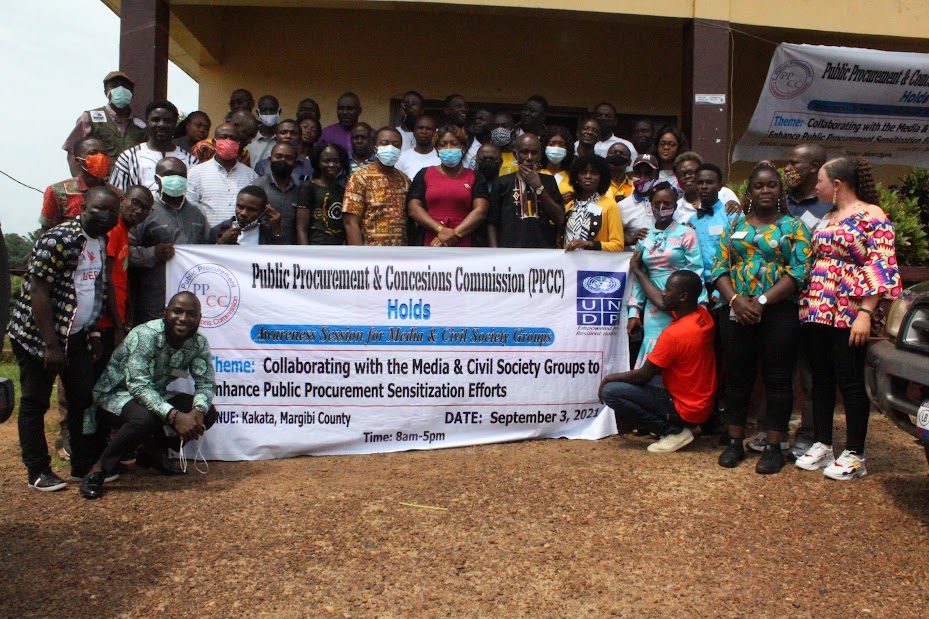
The Executive Director of the Center and Transparency and Accountability in Liberia (CENTAL), Anderson D. Miamen says procurement remains one of the major risk areas where doubtful deeds usually occur, and as such, the need to create massive public awareness and understanding about the process cannot be overemphasized.
Mr. Miamen said there is an ever-pressing need to improve transparency and accountability in all procurement processes and collaboration with the media and civil society organizations to help expose and discourage all forms of waste and abuse in procurement is cardinal.
Making remarks at the opening of a Public Procurement awareness and engagement with the media and civil society organizations organized by the Procurement and Concessions Commission (PPCC) with support from the United Nations Development Programmes (UNDP), Mr. Miamen said CENTAL as one of the lead CSOs in the fight against corruption and integrity building in the country remains committed to advocating for transparency, accountability and integrity in all sectors, including public and other procurement processes. The one-day event held at the Kakata City Hall in Kakata, Margibi County brought together over forty (40) participants from the media and CSOs.
The CENTAL Boss called on the PPCC and the participants to see the collaboration as a valuable tool that will increase awareness about procurement processes and build public trust in those processes. He promised to share the soft copy of the Anti-Corruption Handbook recently launched by CENTAL with all participants to assist them access nearly all anti-graft laws in a single space.
In her presentation, the Chief Executive Officer of the PPCC, Atty. Jargbe Roseline Nagbe-Kowo said the partnership and collaboration with the media and CSOs among other things, seeks to - generate public interests in procurement procedures and governance issues, track the benefits of public contracts to communities, amongst others.
Atty. Nagbe-Kowo stated that the partnership will also increase citizens’ trusts and support as well as ensure ownership and accountability of the process.
Speaking earlier, the PPCC Director of Communication, Nathan N. Bengu said the PPCC remains very keen to working with the media and CSOs to further enhance its work and increase public awareness about procurement processes and laws.
Mr. Bengu said even though the media has over the years been reporting about procurement processes, but much more needed to be done in providing further details on procurement issues and the laws controlling procurement processes in the country. He said the one-day event, therefore, intends to expose the media and CSOs to efforts that have been made by the PPCC so far in gravitating from paper procurement to e-procurement or online procurement process.
Meanwhile, in his presentation, PPCC Director of Compliance, Himmie E. Langford said the PPCC currently has in its employ only eighteen (18) compliance officers clothed with the responsibility of ensuring compliance with all procuring entities across the country, which indicates the understaffing of the PPCC, especially the Compliance Department. As such, Mr. Langford stated that the need for fostering meaningful partnership and collaboration with the media, CSOs and all other key sectors in there remains vital.
According to him, CENTAL is one of the CSOs in the country that is already manifesting the needed partnership and collaboration through meaningful engagements and supports, especially the revitalization of the national Integrity Forum (NIF) and other initiatives aimed at buttressing the efforts of integrity institutions and others in the fight against corruption in Liberia.
CENTAL Launches Handbook on Liberian Anti-Corruption Statutes
PRESS RELEASE:
Monrovia, Friday, August 6, 2021 - A collection of Liberia Anti-Corruption Statutes has been launched by the Center for Transparency and Accountability in Liberia (CENTAL), the National Chapter of Transparency International (TI).
The Book compiled all anti-corruption legislations in Liberia into a single book for easy access by researchers and the people of Liberia. Dubbed “A Compendium of Anti-Corruption Statutes”, the initial draft of the Handbook was validated in May of this year at an event attended by diverse stakeholders in Monrovia, including but not limited to representatives from government, civil society, media, private sector, and public integrity institutions.
The initiative was made possible by CENTAL with support from the Government of Sweden through the Swedish International Development Cooperation Agency (SIDA).
Officially launching the book Thursday, August 5, 2021, at the Bella Casa Hotel in Monrovia, the Head of Development Cooperation at the Embassy of Sweden, Johan Romare, said it was a laudable venture for CENTAL to work with other national stakeholders/partners to undertake such an innovative initiative that will further enhance the fight against corruption in Liberia.
He said the Government of Sweden through its Embassy in Monrovia cherishes its partnership with CENTAL as the Organization continues to play a very critical role in the fight against corruption and integrity in Liberia.
“Sweden is very happy to partner with CENTAL. We know that CENTAL is playing a very important role in the fight against corruption in Liberia,” Mr. Romare said.
In remarks earlier, the Chairman of the Law Reform Commission (LRC), Counsellor Boakai N. Kanneh said the compendium is a very useful tool for the fight against corruption as it allows auditors, investigators, and other actors to easily access different laws from a single document.
Cllr. Kanneh thanked CENTAL for the compilation exercise and called on anti-graft institutions and stakeholders to use the book to inform their works and research activities. He called on the Government of Liberia to muster the political will in the fight against corruption in the country.
“There must be political will in the fight against corruption; mere pronouncements are not sufficient…” Cllr. Kanneh noted.
The Law Reform Commission Chairman also blasted members of the 54th National Legislature for allocating US$30,000.00 to themselves for “legislative engagement projects” with absolutely no instituted mechanism for transparency and accountability.
In separate remarks, representatives of Public Integrity Institutions and civil society organizations at the ceremony lauded CENTAL for the compilation as it will help to further enhance their works.
Also speaking, the Chairman of the Board of Directors of CENTAL, Cllr. T. Negbalee Warner paid special tribute to the Government and people of Sweden for their continuous support not only to CENTAL, but to the Government of Liberia through different projects and programs.
Cllr. Warner also lauded the Government of Liberia through the different integrity institutions and civil society organizations for their partnership with CENTAL over the years.
“We (CENTAL) don’t just condemn and criticize, but we foster partnership; we support and help solve problems,” the CENTAL Board Chairman said.
Cllr. Warner, who is also the Dean of the Louis Arthur Grimes School of Law at the University of Liberia (UL), also described the disbursement of US$30,000.00 to lawmakers as ‘official corruption’ and encouraged civil society organizations in the country to challenge the legitimacy of the process before the Supreme Court of Liberia.
The NIBA program is a 3.5-year program funded by the Government of Sweden through the Swedish International Development Cooperation Agency (SIDA) that is engaging every sector of the Liberian society to increase citizens’ awareness and understanding of corruption and other related issues and to demand for accountability at all levels. Engagements are being held at the community level as well as with national government. It covers seven counties – Bong, Nimba, Grand Bassa, Rivercess, Bomi, Gbarpolu and Montserrado.
SIDA Provides CENTAL Additional Support
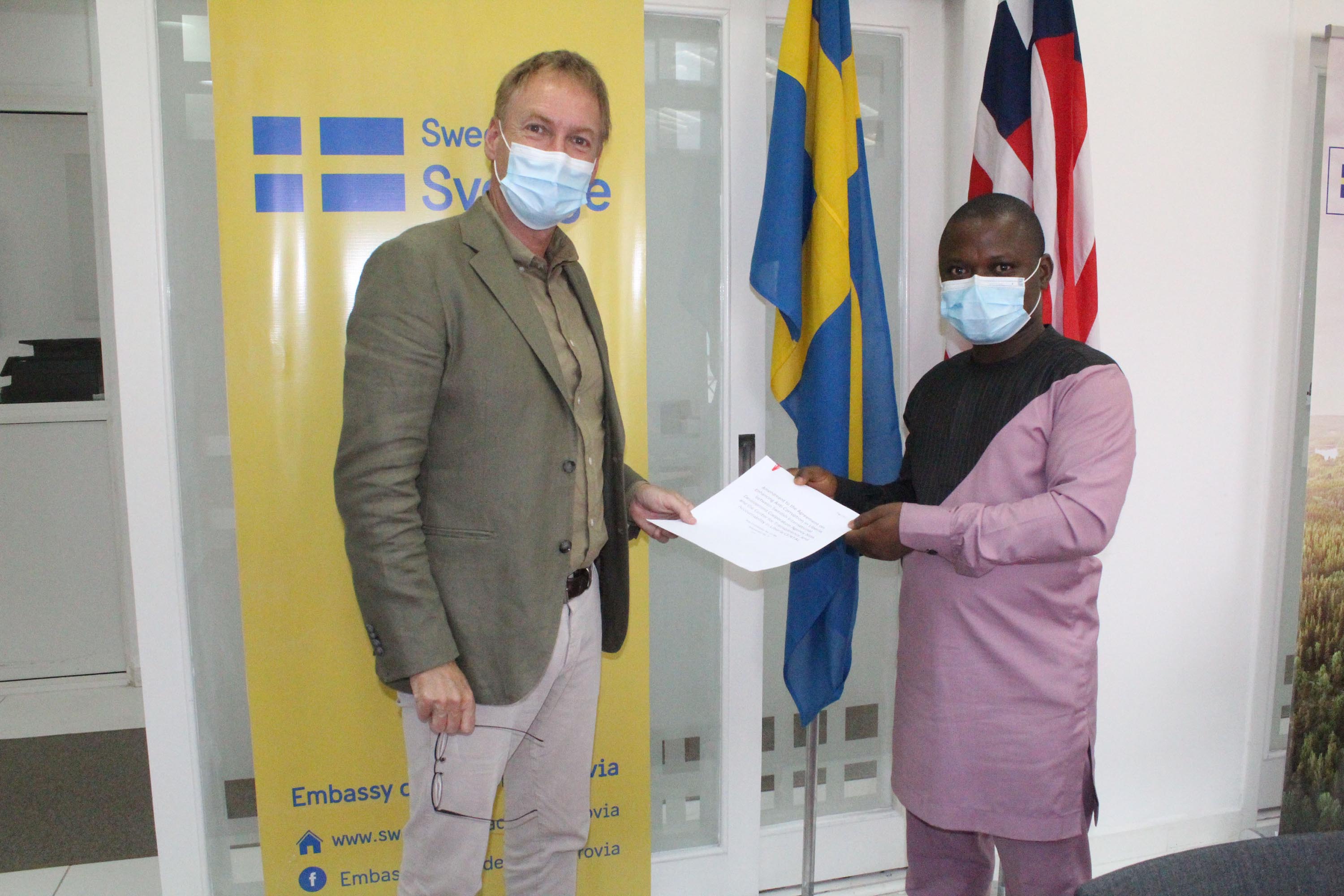
Press Release:
SIDA Provides CENTAL Additional Support...
Monrovia, Tuesday, August 3, 2021-The Swedish International Development Cooperation Agency (SIDA), represented by its Embassy in Monrovia, has again demonstrated its commitment to the fight against corruption in Liberia by increasing support to the National Integrity Building and Anti-Corruption (NIBA) Program implemented by the Center for Transparency and Accountability in Liberia (CENTAL).
Nearly a year ago (August 5, 2020), CENTAL and SIDA signed a 3.5-year agreement for the implementation of the NIBA program across seven (7) counties in Liberia.
Making remarks at the signing ceremony of the amended agreement on Tuesday, August 3, 2021, CENTAL Executive Director, Mr. Anderson D. Miamen, noted that since the roll-out of the NIBA Program and throughout the implementation of its inception phase, SIDA has shown unprecedented degree of flexibilities in granting and approving suggestions and requests made by CENTAL to adjustments to different activities in the NIBA Program.
Earlier, the Head of Development Cooperation at the Embassy of Sweden in Monrovia, Johan Romare said CENTAL has been seen as a very strategic partner to the Embassy in its quest to fight corruption and promote good governance in Liberia.
“CENTAL is very key to Liberia; from our assessment so far, you represent civil society organizations in holding government accountable, and you are doing it in a very strategic way…,” Romare said.
The Embassy’s Head of Development Cooperation further stated: “You’re the eyes, feet, hand and everything for the Embassy. You’re the change-maker and we are happy for you.”
The amendment allows CENTAL to purchase another vehicle to implement its NIBA Program in seven counties - Montserrado, Bong, Nimba, Grand Bassa, Rivercess, Bomi and Gbarpolu. The Program seeks to among other things, empower citizens with relevant pieces of information to demand for and take action against corruption in Liberia.
_______________________________
For further information:
Sam Zota, Jr./
Media & Communications Officer/CENTAL
Dean Warner Lauds CENTAL Staff …But Warns Against Complacency
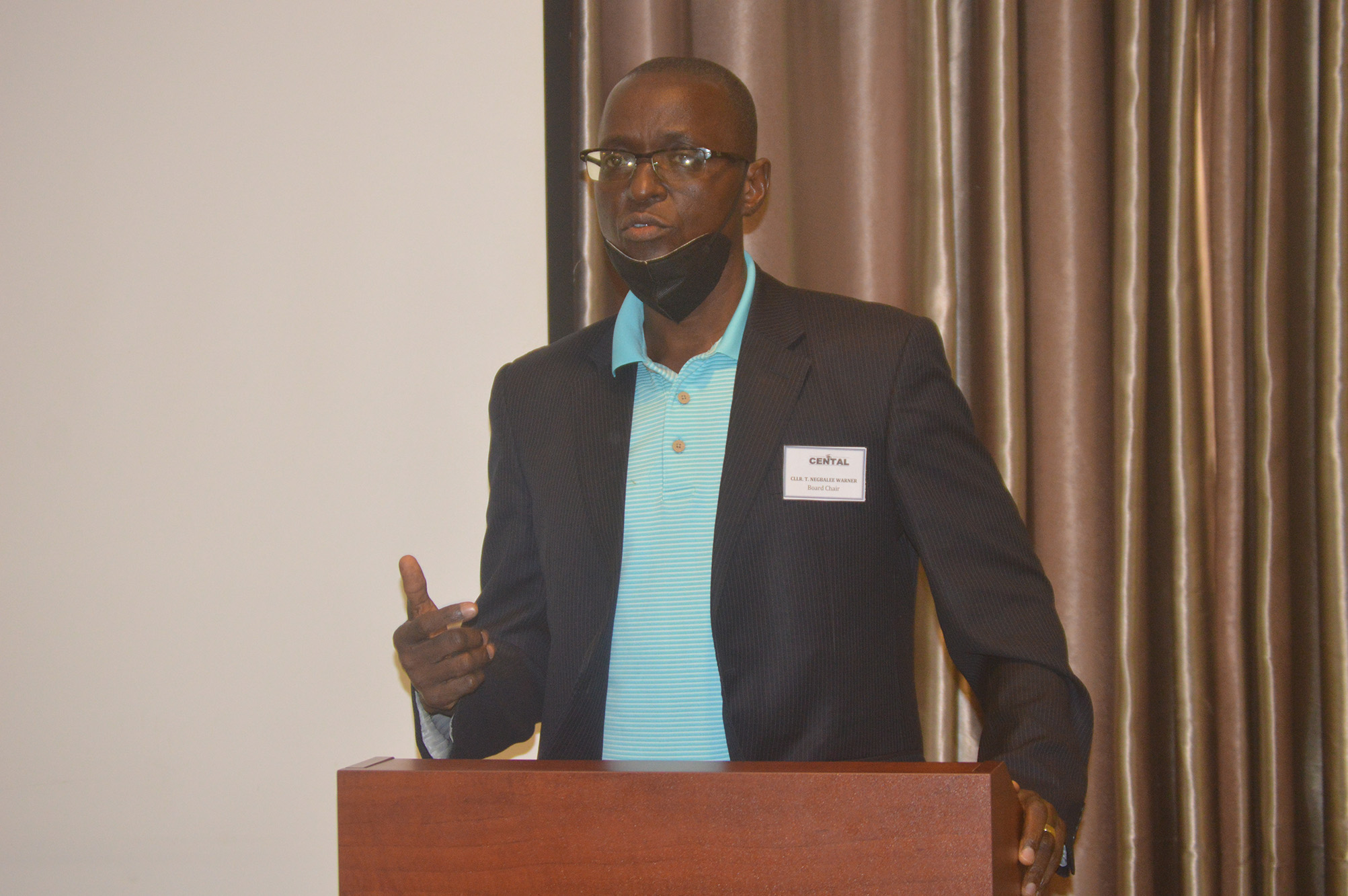
Buchanan City, Grand Bassa County, Saturday, July 31, 2021- The Dean of the Louis Arthur Grimes School of Law at the University of Liberia (UL) and Chair of the Board of Directors of the Center for Transparency and Accountability in Liberia (CENTAL) has lauded the management and staff for the level of progress achieved so far in the implementation of the National Integrity Building and Anti-Corruption (NIBA) Program.
Counselor T. Negbalee Warner said as the Team completes the first phase of the NIBA program and gears up for the second phase, it was very important for the team to guide themselves against complacencies and mediocrities, despite the gains made so far.
Making special remarks at the ongoing Retreat (Joint Review Leaning and Sharing 2021) in Buchanan, Grand Bassa County, Cllr. Warner said activities implemented so far under the NIBA program show positive results that need to be built upon and maintained.
“I want to thank you and tell you that you’ve far exceeded my expectation with your performances here and over time. You have really proven yourselves wealthy of our commendations and compliments”, Dean Warner said.
The results of the first phase of the NIBA program have been summed up into Nine (9) key results achieved: Increased knowledge around anti-corruption issues; Increased reporting of corruption; Increased Visibility; Strengthened relationships with stakeholders; Established Structures; Increased influence; Enhanced commitment to Integrity and Anti-Corruption work; Enhanced Gender equity; and Strengthened capacity to perform.
The different program interventions were rolled out through five key areas/activities – Advocacy and Legal Advice Center (ALAC); National Integrity Forum (NIF); Youth Engagement Program - Integrity Club (IClub); Open Expenditure Initiatives (OEI); and Media and Communications.
For his part, CENTAL’s Executive Director Anderson D. Miamen thanked the Board of Director for being very supportive of the Team’s work, especially in the implementation of the NIBA program.
NIBA is a 3.5-year program funded by the Government of Sweden through the Swedish International Development Cooperation Agency (SIDA) that’s engaging every sector of the Liberian society to increase citizens’ awareness and understanding of corruption and other related issues and to demand for accountability at all levels. Engagements are being held at the community level as well as the national government. It covers seven counties – Bong, Nimba, Grand Bassa, Rivercess, Bomi, Gbarpolu and Montserrado.
Reflecting and Planning for Greater Impact
Press Release
Buchanan City, Grand Bassa County, Thursday, July 29, 2021- The Center for Transparency and Accountability in Liberia (CENTAL) has commenced a three-day retreat to reflect on lessons learned, impacts and challenges experienced during the implementation of the inception phase of its National Integrity Building and Anti-Corruption (NIBA) Program.
Held under the theme: ‘Reflecting and Planning for Greater Impact,’ the retreat seeks to improve organizational performance through reflection on successes and challenges in the inception phase of the NIBA Program implementation as well as to collectively plan and develop an agenda for the upcoming phase of the Program.
Speaking at the opening of the retreat being held at Hotel Buchanan in Grand Bassa County on Thursday, July 29, 2021, CENTAL’s Executive Director Anderson Miamen lauded the staff for their continuous contributions to the work and viability of the Organization in the implementation of the first/inception phase of its National Integrity Building and Anti-Corruption Program.
He urged them to beware of their roles and responsibilities in the fight against corruption and integrity building in Liberia and the challenges involved in the process. The CENTAL Boss also thanked the Board of Directors for their unflinching support to work of the Team over the period and looks forward to more support for the years ahead.
Mr. Miamen equally admonished the staff to further prepare themselves for the task ahead in the implementation of the second phase of the NIBA Program.
The retreat will cover presentations on different aspects of the NIBA Program including: Monitoring and Evaluation; Youth Engagement Program- IClub; Media and Communications; Open Expenditure Forum; and the Advocacy and Legal Advice Center. Presentations will also be delivered on the National Integrity Forum, Finances, Revised Institutional Documents as well as engagements by County Field Officers at the local level.
The Chair of the Board of Directors, Cllr. T. Negbalee Warner is expected to grace the retreat and further encourage the staff as they gear up to implement the second phase of the NIBA Program.
The NIBA Program is a 3.5-year project targeting seven counties – Montserrado, Bong, Nimba, Grand Bassa, Rivercess, Bomi, and Gbarpolu. It seeks to among other things, empower citizens with relevant pieces of information to demand for and take action against corruption in Liberia.
For further information, please contact;
This email address is being protected from spambots. You need JavaScript enabled to view it.
CENTAL Wins Outstanding CSO In Accountability & Good Governance Promotion Award
Press Statement for Immediate Release
Press Statement for Immediate Release
July 12, 2021
Message to the African Union (AU) and Member States in Commemoration of the 2021 African Anti-corruption Day on the theme: “Regional Economic Communities: Critical Actors in the Implementation of the African Union Convention on Preventing and Combating Corruption”.
Distinguished ladies and gentlemen of the Press, Fellow Liberians, and Development Partners
As you may be aware, The African Union Convention on Preventing and Combating Corruption (AUCPCC) was adopted in Maputo, Mozambique on 11 July 2003 and came into force in 2006. To date, the Convention has been ratified by 44 Member States of the African Union, including Liberia. Since the adoption of the Convention, African states have made significant efforts in the fight against corruption, including the establishment of national laws and the creation of anti-corruption agencies. However, major challenges still remain. In recognition of the vast progress that has been made and cognizant of the need to continually reflect on approaches to end corruption, the African Union designated 11 July as the African Anti-Corruption Day, just as December 9 is celebrated as International Anti-Corruption Day.
Thus, the African Union Commission and her specialized bodies, especially the African Union Advisory Board on Corruption (AUBC) have since been holding relevant activities and events to commemorate the day. The Commission is not mistaken in its decision, as Corruption remains the major hurdle to poverty reduction, sustainable and inclusive economic development, as well as peace and stability on the continent, especially in poor countries such as Liberia. In the words of the AU Commission, July 11 is meant to give prominence to the fight against corruption through the commemoration of the adoption of the AUCPCC as a mechanism for fighting corruption in Africa.
It must be reiterated that Liberia has signed and adopted the African Union Convention Against Corruption. Liberia ratified the Convention in 2007 and has since been an integral part of legal frameworks for fighting against corruption in the country, in addition to the UN Convention Against Corruption (UNCAC), Economic Community of West African States Protocol on Corruption, and Sustainable Development Goals, especially Goal 16.5.
Distinguished ladies and gentlemen of the Press, fellow Liberians, as an integral part of global and continental fights against corruption, Transparency International and her African Chapters, including the Center for Transparency and Accountability (CENTAL), join the AU Commission and other stakeholders in Commemorating July 11 as African Anti-Corruption Day. For some time now, the Transparency International movement has consistently reminded the AU Commission and her members states, the Liberian Government included, about their obligations and commitments to fostering a robust, inclusive, and dynamic fight against corruption – a fight that does not protect confidantes and cronies of the power-that-be, but impartially and timely investigates and prosecutes all corruption cases. Furthermore, we have been urging African Governments to move away from rhetoric to more tangible and impactful actions, including but not limited to strengthening anti-corruption legal frameworks, providing adequate financial and moral support to public integrity institutions, as well as increasing efforts to address immunity, ensuring that there are no untouchable individuals and groups in the fight against corruption. This is particularly true for Liberia that continues to struggle with addressing Impunity due to limited political will, weak implementation of laws and policies, and poorly funded public integrity institutions such as the Liberia Anti-Corruption Commission, General Auditing Commission, and Public Procurement and Concession Commission, and Liberia Extractives Industries Transparency Initiative.
As the African Union Commission celebrates another July 11 (African Anti-Corruption Day), on behalf of Transparency International Secretariat and the 28 African Chapters, the Center for Transparency and Accountability in Liberia is pleased to inform the public about a 21-count letter to the AU Commission and her Member States. Among other things, the 28 Chapters of Transparency International across all Africa’s Regional Economic Communities in Central, East, North, Southern and West Africa take the opportunity again to:
- Applaud the African Union (AU) for earmarking 11 July as African Anti-Corruption Day and welcome this year’s theme: “Regional Economic Communities: Critical Actors in Implementing the African Union Convention on Preventing and Combatting Corruption.”
- Commend the 44 Member States of the African Union that have ratified the African Union Convention on Preventing and Combatting Corruption and implore the remaining 11 Member States to take measures to ratify this important Convention.
- Further commend the 34 Member States of the African Union that have ratified the African Charter on Democracy, Elections and Governance, and implore the remaining 21 Member States to take swift measures to ratify this important African Treaty.
- Recognise that by ratifying these treaties, African countries reinforce their commitment to democracy, human rights, and the rule of law, as well as to the underlying values of transparency, integrity, participation, and accountability.
- Note with great concern that corruption is and remains a significant threat and hindrance to African States, particularly in establishing democratic institutions and attaining sustainable development goals.
- Remind African leaders that the AUCPCC through Article 12(2) requires States Parties to ensure and provide for the full participation of civil society in the monitoring process and consult civil society in the implementation of the Convention.
- Further note that the impact of corruption on the continent’s economic development remains deep and visible and cannot be underestimated. Also note that corruption is not a victimless crime and often affects those who suffer most – vulnerable, poor, and marginalised individuals.
- Urge State Parties to ensure that they fully implement commitments they have undertaken by ratifying these treaties. Many States Parties are yet to put in place mechanisms for whistle-blower protection despite committing to adopting measures to protect informants, witnesses of corruption and related offenses, and protection of citizens from acts of reprisal.
- Further Urge States Parties to the AUCPCC to take swift action to report their progress on the implementation of the AUCPCC as required by Article 22(7) of the Convention. Appreciate the efforts of the very few States that have so far reported.
- Reiterate the AUCPCC’s provision for States Parties to create an enabling environment for civil society and the media to hold governments to the highest levels of transparency and accountability in the management of public affairs.
- Remind the African Union leaders of our call in 2018 for the African Union to,
- Develop or endorse minimum standards and guidelines for transparent and accountable procurement.
- Set up and implement a community of practice dedicated to transparent and accountable procurement and the pursuit of value for money.
- Dedicate resources to procurement training and monitoring.
- Invest in research on the practice of procurement within Africa and continually and publicly monitor progress towards implementation of the minimum standards agreed.
- Recognise that the Open Contracting Data Standard (OCDS) and the Open Contracting Principles - established in 2014 - help facilitate the standardised disclosure of data, clarify documents applicable to the contracting process and allow for deeper and better analysis of data; and therefore remind AU leaders of our call in 2018 for the AU to:
- Encourage and facilitate Member States to join open government processes and introduce open contracting through the adoption of the OCDS and Open Contracting Principles in all sectors.
- Introduce open contracting as the default procurement process of the AU.
- Highly commend the AU leadership in endorsing, promoting and following up on the Common African Position on Assets Recovery (CAPAR).
- Entreat African States to address corruption in service delivery in education, water, judicial and health systems, including in crisis situations such as the Covid-19 pandemic, and remind leaders of our 2018 call the AU to:
- Promote transparency and accountability in education, health, water sector and justice systems, ensure sanctions and end impunity for those convicted of corrupt practices.
- Create mechanisms to collect citizens’ complaints and strengthen whistleblower protection.
- Remind African leaders of our 2016 call on governments to disclose beneficial ownership as a way of ending the secrecy that enables corruption; and our 2018 call on governments to:
- Publish timelines for establishing public registers, in open data format, containing beneficial ownership information.
- Ensure that foreign companies operating in Africa are registered and disclose their beneficial owners.
- Require bidders for public contracts to undergo due diligence procedures to verify the background of the company and its senior officers, majority shareholders and ultimate beneficial owners, as well as disclose the identity of beneficial owners.
- Require high-risk sectors, such as the real estate industry, to have anti-money laundering programme requirements, including customer due diligence and adequate record keeping.
- Ensure there are appropriate sanctions proportionate to the misconduct, including criminal prosecutions, for those found guilty of breaching these and related laws, and those found making false declarations.
- Urge African States to step up measures against money laundering and the financing of terrorism. Call on African leaders to ensure:
- that mechanisms are in place to allow all the relevant persons and entities to comply with their obligation to report suspicious transactions,
- that information on anti-money laundering and financing of terrorism is exchanged among the relevant bodies at regional level.
- the restructuring, adequate resourcing and capacity-building of investigative and prosecuting authorities on money laundering and financing of terrorism
- that each State Party conducts a national money laundering risk assessment and puts in place the necessary response measures.
- Highlight the importance of the Extractives sector in growing and sustaining Africa’s economies and placing countries on a recovery path against the poor economic performance occasioned by COVID-19. Urge Member States to require transparency and accountability in the mining sector including the publication of reports on agreements, public participation, publishing information on operations of mining companies including on joint venture payments. Also remind Member States of commitments to the Africa Mining Vision and the Extractives Industry Transparency Initiative (EITI).
- Flag the urgent need for prudent public debt management in light of the borrowing related to Covid-19, and the impact of COVID-19 on African economies and recovery and call on Member States to put in place efficient systems for transparency and accountability in the acquisition of public debt, use and retirement.
- Stand with all communities, families and people facing the dreadful impacts of the Covid-19 pandemic and welcome all efforts to alleviate this situation. Urge African leaders to
- Ensure transparency in vaccine acquisition and distribution and ensure vaccine equity. Remind African leaders that Africa is already lagging behind in vaccination and that transparency is critical in ensuring target populations especially vulnerable groups get vaccinated.
- Ensure transparent and accountable procurement in the management of COVID-19 pandemic and make publicly available Beneficial Ownership information of companies winning COVID 19 tenders.
- Reaffirm our commitment to work with the African Union through the distinguished African Union Advisory Board on Corruption, the African Governance Architecture and other Organs related thereto, and most especially work with the anti-corruption agencies in our various Member States to eliminate corruption from the daily lives of African citizens.
- Convey the assurances of our highest consideration.
LOCATION
22nd Street, Sinkor
Tubman Boulevard
Monrovia, Liberia
Phone: +231 88 681 8855
Email: info@cental.org.lr
Website: www.cental.org.lr
SUBSCRIBE
Get updates and important events straight to your inbox. We don't spam

